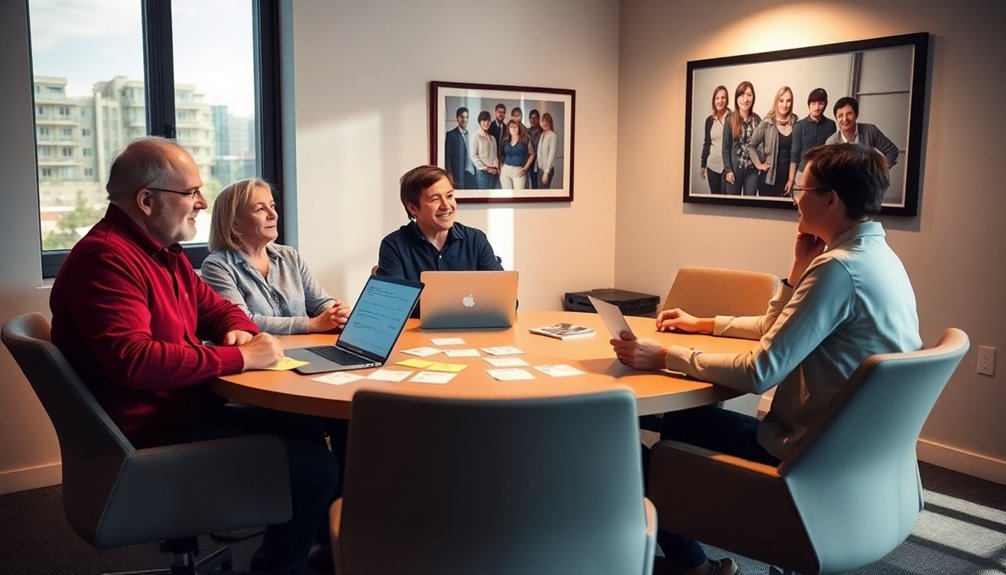Your past coworker relationships reveal essential insights for enhancing teamwork. Reflecting on team dynamics helps you recognize individual strengths, fostering better collaboration. Effective communication is key; it creates an open environment and builds trust among colleagues. Remember, conflicts are natural, but the way you navigate them can strengthen bonds. Emphasizing active listening and reliability encourages a supportive atmosphere. Additionally, collaborating across diverse skill sets often leads to innovative solutions. By learning from your experiences, you not only grow as a professional but also enrich your future partnerships. Discovering more about these nuances can further elevate your understanding.
Key Takeaways
- Reflect on communication styles to understand how they shaped relationships and collaboration effectiveness with past coworkers.
- Identify individual strengths within the team to recognize contributions and dynamics that influenced group performance.
- Analyze moments of conflict resolution to learn how trust and active listening impacted relationships and outcomes.
- Consider the role of regular check-ins in fostering stronger connections and maintaining open communication among colleagues.
- Evaluate past successes and celebrations to understand how they built camaraderie and morale within the team.
Understanding Team Dynamics

Understanding team dynamics is essential for fostering a productive work environment.
You'll notice that effective collaboration hinges on recognizing individual strengths and roles within a team. When you understand how your colleagues interact, you can better navigate conflicts and enhance cooperation.
For instance, in creative fields, proximity can spark problem-solving and innovation, while in service industries, mutual respect and support create a positive atmosphere that benefits both staff and customers.
As you develop your skills in teamwork, remember that a balance of supervision and friendship can lead to greater trust and open communication. Additionally, incorporating mindfulness practices into team interactions can help manage stress and improve overall group cohesion.
Ultimately, embracing team dynamics encourages a shared commitment to goals, boosting overall productivity and job satisfaction.
The Role of Communication

Effective communication plays an essential role in fostering strong coworker relationships and enhancing team dynamics. When you share your thoughts clearly and listen actively, you create an open environment where ideas flow freely. This not only helps resolve misunderstandings but also encourages collaboration, leading to innovative solutions.
Regular check-ins and constructive feedback can strengthen your connection with colleagues, making everyone feel valued and understood. Remember, tone and body language matter too; they can reinforce your message or create confusion.
Building Trust Among Colleagues

How can you foster trust among colleagues in a fast-paced work environment? Start by prioritizing open communication. Share your ideas and encourage others to do the same. It's crucial to be transparent about your goals and challenges.
- Show empathy: Listen actively to your colleagues' concerns.
- Be reliable: Follow through on your commitments consistently.
- Celebrate successes: Acknowledge team accomplishments to build morale.
- Encourage collaboration: Create opportunities for teamwork through joint projects.
- Incorporate feedback mechanisms: Establish regular check-ins to discuss progress and areas for improvement, which can enhance audience engagement strategies.
Navigating Conflicts Effectively

Building trust among colleagues lays the groundwork for addressing conflicts constructively. When conflicts arise, approach them with openness and a desire to understand differing perspectives.
Start by actively listening to your coworker's concerns without interrupting. This shows respect and can help de-escalate tension. Use "I" statements to express your feelings—like "I feel frustrated when deadlines aren't met"—to avoid sounding accusatory.
Aim for a solution that satisfies both parties, fostering collaboration rather than competition. Remember, it's about finding common ground and maintaining positive relationships. Embracing challenges builds resilience in conflict situations can lead to more effective teamwork and improved outcomes.
After resolving the issue, follow up to confirm everyone feels heard and valued, reinforcing trust and paving the way for smoother interactions in the future. Guiding conflicts effectively strengthens your team's dynamics.
Collaborating Across Industries

Collaboration thrives when teams leverage their unique strengths across different industries. By blending diverse skill sets, you can reveal innovative solutions and enhance productivity.
When you work with individuals from various backgrounds, you gain fresh perspectives and creative approaches that can propel your projects forward. Imagine this synergy:
- Graphic designers brainstorming with marketers to create compelling campaigns
- Engineers teaming up with healthcare professionals to improve patient technology
- Chefs collaborating with nutritionists to develop healthier menus
- Writers working alongside tech experts to craft engaging user manuals
These collaborations not only foster camaraderie but also push boundaries, driving success. Additionally, ethical leadership can significantly enhance the collaborative process by fostering a culture of trust and accountability among team members.
Embrace the opportunity to connect with others, and watch your projects flourish in unexpected ways.
Lessons From Past Experiences

Reflecting on past experiences often reveals valuable lessons that shape our professional growth. You've likely encountered situations that taught you the importance of teamwork, communication, and adaptability. These insights can guide your future interactions. Additionally, incorporating mindfulness techniques into your daily routine can enhance your ability to manage workplace stress and improve collaboration.
| Lesson | Application |
|---|---|
| Importance of Communication | Clear dialogue fosters trust. |
| Embracing Diversity | Different perspectives enhance problem-solving. |
| Learning from Conflict | Addressing issues early prevents escalation. |
The Impact of Relationships on Growth

The relationships you cultivate in the workplace greatly influence your professional growth. When you build strong connections, you open doors to new opportunities and insights.
These interactions can shape your career trajectory in profound ways.
- Mentorship: Learning from experienced colleagues can accelerate your development.
- Support Networks: Having allies during challenging projects boosts your confidence and resilience.
- Collaboration: Working closely with diverse teams sparks creativity and innovation.
- Feedback: Constructive criticism from peers helps you refine your skills and perspective.
Frequently Asked Questions
How Do Past Coworker Relationships Affect Current Work Performance?
Past coworker relationships greatly impact your current work performance.
Positive interactions foster collaboration and open communication, enhancing your ability to work effectively in teams. Conversely, unresolved conflicts may create tension, affecting your focus and productivity.
Reflecting on past experiences helps you identify strengths and areas for improvement, shaping your approach to teamwork. Building on these lessons, you can cultivate healthier relationships that contribute to a more productive and supportive work environment.
What Are Signs of a Toxic Coworker Relationship?
Signs of a toxic coworker relationship include constant negativity, lack of support, and frequent gossip.
You might notice that interactions leave you feeling drained or anxious. If your ideas are dismissed or undermined, it's a red flag.
Additionally, if you find yourself avoiding this person, that's a strong indicator of toxicity.
Open communication is essential; if conversations often lead to conflict, it's time to reassess the dynamics of that relationship.
How Can I Reconnect With Former Colleagues?
Imagine you bump into an old colleague at a coffee shop, sparking memories of team projects.
To reconnect with former colleagues, start by reaching out via social media or email.
Share a fond memory or ask how they've been.
Suggest grabbing coffee or attending a networking event together.
You'll find that rekindling those relationships often leads to valuable connections and support, helping you grow both personally and professionally.
What Impact Do Coworker Relationships Have on Job Satisfaction?
Coworker relationships greatly impact your job satisfaction. When you build strong connections with colleagues, you foster a supportive environment that enhances collaboration and communication.
You'll feel more engaged and motivated, leading to increased productivity and a sense of belonging. Positive interactions can also ease stress and create a more enjoyable workplace.
Ultimately, nurturing these relationships not only boosts your satisfaction but also contributes to a thriving team dynamic and overall company success.
How Can I Learn From Negative Coworker Experiences?
To learn from negative coworker experiences, reflect on what went wrong and identify specific triggers.
Consider how communication styles affected interactions and think about ways you could've approached situations differently.
By acknowledging your role in conflicts, you'll grow personally and professionally.
Seek feedback from trusted colleagues to gain perspective, and use these insights to improve future relationships.
Conclusion
Reflecting on your past coworker relationships is like piecing together a puzzle; each connection reveals a part of your professional journey. By understanding team dynamics, communication, and conflict resolution, you not only enhance your current collaborations but also pave the way for future growth. Embrace the lessons learned from those experiences, as they shape your approach to teamwork. Ultimately, the insights gained from these relationships can be the key to revealing your potential in any workplace.









